《大学英语》课程教学课件(讲稿)A digital detox
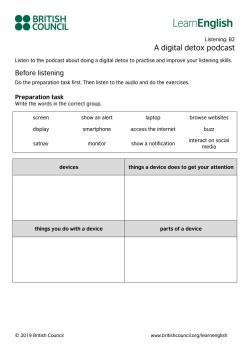
888 LearnEnglish Listening:B2 A digital detox podcast Listen to the podcast about doing a digital detox to practise and improve your listening skills. Before listening Do the preparation task first.Then listen to the audio and do the exercises Preparation task Write the words in the correct group. screen show an alert laptop browse websites display smartphone access the internet buzz satnav monitor show a notification interact on social media devices things a device does to get your attention things you do with a device parts of a device ©2019 British Council www.britishcouncil.org/learnenglish
© 2019 British Council www.britishcouncil.org/learnenglish Listening: B2 A digital detox podcast Listen to the podcast about doing a digital detox to practise and improve your listening skills. Before listening Do the preparation task first. Then listen to the audio and do the exercises. Preparation task Write the words in the correct group. screen show an alert laptop browse websites display smartphone access the internet buzz satnav monitor show a notification interact on social media devices things a device does to get your attention things you do with a device parts of a device
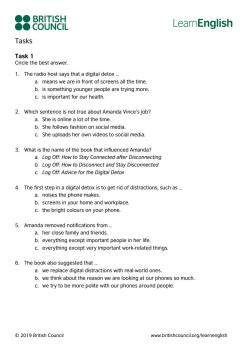
888 LearnEnglish Tasks Task 1 Circle the best answer. 1.The radio host says that a digital detox. a.means we are in front of screens all the time. b.is something younger people are trying more. c.is important for our health. 2.Which sentence is not true about Amanda Vince's job? a.She is online a lot of the time. b.She follows fashion on social media c.She uploads her own videos to social media. 3.What is the name of the book that influenced Amanda? a.Log Off:How to Stay Connected after Disconnecting b.Log Off:How to Disconnect and Stay Disconnected c.Log Off:Advice for the Digital Detox A. The first step in a digital detox is to get rid of distractions,such as. a.noises the phone makes. b.screens in your home and workplace c.the bright colours on your phone. 5.Amanda removed notifications from a.her close family and friends. b.everything except important people in her life. c.everything except very important work-related things. 6.The book also suggested that. a.we replace digital distractions with real-world ones. b.we think about the reason we are looking at our phones so much. c.we try to be more polite with our phones around people. ©2019 British Council www.britishcouncil.org/learnenglish
© 2019 British Council www.britishcouncil.org/learnenglish Tasks Task 1 Circle the best answer. 1. The radio host says that a digital detox . a. means we are in front of screens all the time. b. is something younger people are trying more. c. is important for our health. 2. Which sentence is not true about Amanda Vince’s job? a. She is online a lot of the time. b. She follows fashion on social media. c. She uploads her own videos to social media. 3. What is the name of the book that influenced Amanda? a. Log Off: How to Stay Connected after Disconnecting b. Log Off: How to Disconnect and Stay Disconnected c. Log Off: Advice for the Digital Detox 4. The first step in a digital detox is to get rid of distractions, such as . a. noises the phone makes. b. screens in your home and workplace. c. the bright colours on your phone. 5. Amanda removed notifications from . a. her close family and friends. b. everything except important people in her life. c. everything except very important work-related things. 6. The book also suggested that . a. we replace digital distractions with real-world ones. b. we think about the reason we are looking at our phones so much. c. we try to be more polite with our phones around people

888 LearnEnglish 7.Amanda and her partner. a.tried a two-day digital detox first b.found it impossible to completely disconnect. c.found it very easy to do a digital detox for a weekend. 8.Amanda believes that a digital detox. a.is not a good idea if you have a lot of work. b.is better if it's for a week,not just a weekend. c.is something everyone will enjoy. Task 2 Put the words and phrases in order to make sentences. 1.ever Have you would be wondered what like?it 2.that?by mean do What you 3.confess,I too.have to that to me happens 4.to the I'm that.first admit 5.drastic.sound doesn't This too 6.the next to ready You're step.take Discussion Would you like to do a digital detox? ©2019 British Council www.britishcouncil.org/learnenglish
© 2019 British Council www.britishcouncil.org/learnenglish 7. Amanda and her partner . a. tried a two-day digital detox first. b. found it impossible to completely disconnect. c. found it very easy to do a digital detox for a weekend. 8. Amanda believes that a digital detox . a. is not a good idea if you have a lot of work. b. is better if it’s for a week, not just a weekend. c. is something everyone will enjoy. Task 2 Put the words and phrases in order to make sentences. 1. ever Have you would be wondered what like? it 2. that? by mean do What you 3. confess, I too. have to that to me happens 4. to the I’m that. first admit 5. drastic. sound doesn’t This too 6. the next to ready You’re step. take Discussion Would you like to do a digital detox?
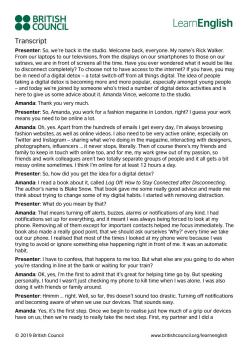
888 LearnEnglish Transcript Presenter:So,we're back in the studio.Welcome back,everyone.My name's Rick Walker. From our laptops to our televisions,from the displays on our smartphones to those on our satnavs,we are in front of screens all the time.Have you ever wondered what it would be like to disconnect completely?To choose not to have access to the internet?If you have,you may be in need of a digital detox-a total switch-off from all things digital.The idea of people taking a digital detox is more and more popular.especially amongst young people and toda ne who's trie deto activities and is Amanda:Thank you very much. anda On.yes,Apaft from the hundreds of emalls get every day.Im aways browsing nion websites,as well as online videos.I also ne I to be very active online,espe cially on Twitter and Instagram-sharing what we're doing in the magazine,interacting with designers, photographers,influencers.it never stops,literally.Then of course there's my friends and family to keep in touch with online too,and for me,my work grew out of my passion,so friends and work colleagues aren't two totally separate groups of people and it all gets a bit messy online sometimes.I think I'm online for at least 12 hours a day. Presenter:So,how did you get the idea for a digital detox? Amanda:I read a book about it,called Log Off:How to Stay Connected after Disconnecting. The author's name is Blake Snow.That book gave me some really good advice and made me think about trying to change some of my digital habits.I started with removing distraction. Presenter:What do you mean by that? Amanda:That means turning off alerts,buzzes,alarms or notifications of any kind.I had notifications set up for everything,and it meant I was always being forced to look at my phone.Removing all of them except for important contacts helped me focus immediately.The book also made a really good point,that v 金m ou our phon I reali ha t mos t of the I was t was an automatic habit. Presenter:I have to confess,tha t happens to me too.But what else are you going to do when you're standing in line at the bank or waiting for your train? Amanda:OK,yes,I'm the first to admit that it's great for helping time go by.But speaking personally,I found I wasn't just checking my phone to kill time when I was alone.I was also doing it with friends or family around. Presenter:Hmmm.right.Well,so far,this doesn't sound too drastic.Turning off notifications and becoming aware of when we use our devices.That sounds easy. Amanda:Yes,it's the first step.Once we begin to realise just how much of a grip our devices have on us,then we're ready to really take the next step.First,my partner and I did a ©2019 British Council www.britishcouncil.org/learnenglish
© 2019 British Council www.britishcouncil.org/learnenglish Transcript Presenter: So, we’re back in the studio. Welcome back, everyone. My name’s Rick Walker. From our laptops to our televisions, from the displays on our smartphones to those on our satnavs, we are in front of screens all the time. Have you ever wondered what it would be like to disconnect completely? To choose not to have access to the internet? If you have, you may be in need of a digital detox – a total switch-off from all things digital. The idea of people taking a digital detox is becoming more and more popular, especially amongst young people – and today we’re joined by someone who’s tried a number of digital detox activities and is here to give us some advice about it. Amanda Vince, welcome to the studio. Amanda: Thank you very much. Presenter: So, Amanda, you work for a fashion magazine in London, right? I guess your work means you need to be online a lot. Amanda: Oh, yes. Apart from the hundreds of emails I get every day, I’m always browsing fashion websites, as well as online videos. I also need to be very active online, especially on Twitter and Instagram – sharing what we’re doing in the magazine, interacting with designers, photographers, influencers . it never stops, literally. Then of course there’s my friends and family to keep in touch with online too, and for me, my work grew out of my passion, so friends and work colleagues aren’t two totally separate groups of people and it all gets a bit messy online sometimes. I think I’m online for at least 12 hours a day. Presenter: So, how did you get the idea for a digital detox? Amanda: I read a book about it, called Log Off: How to Stay Connected after Disconnecting. The author’s name is Blake Snow. That book gave me some really good advice and made me think about trying to change some of my digital habits. I started with removing distraction. Presenter: What do you mean by that? Amanda: That means turning off alerts, buzzes, alarms or notifications of any kind. I had notifications set up for everything, and it meant I was always being forced to look at my phone. Removing all of them except for important contacts helped me focus immediately. The book also made a really good point, that we should ask ourselves ‘Why?’ every time we take out our phone. I realised that most of the times I looked at my phone were because I was trying to avoid or ignore something else happening right in front of me. It was an automatic habit. Presenter: I have to confess, that happens to me too. But what else are you going to do when you’re standing in line at the bank or waiting for your train? Amanda: OK, yes, I’m the first to admit that it’s great for helping time go by. But speaking personally, I found I wasn’t just checking my phone to kill time when I was alone. I was also doing it with friends or family around. Presenter: Hmmm . right. Well, so far, this doesn’t sound too drastic. Turning off notifications and becoming aware of when we use our devices. That sounds easy. Amanda: Yes, it’s the first step. Once we begin to realise just how much of a grip our devices have on us, then we’re ready to really take the next step. First, my partner and I did a
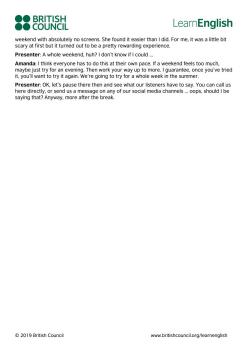
8881 LearnEnglish weekend with absolutely no screens.She found it easier than I did.For me,it was a little bit scary at first but it turned out to be a pretty rewarding experience. Presenter:A whole weekend,huh?I don't know if I could. Amanda:I think everyone has to do this at their own pace.If a weekend feels too much, maybe just try for an evening.Then work your way up to more.I guarantee,once you've tried it,you'll want to try it again.We're going to try for a whole week in the summer. Presenter:OK,let's pause there then and see what our listeners have to say.You can call us here directly,or send us a message on any of our social media channelsoops,should I be saying that?Anyway,more after the break ©2019 British Council www.britishcouncil.org/learnenglish
© 2019 British Council www.britishcouncil.org/learnenglish weekend with absolutely no screens. She found it easier than I did. For me, it was a little bit scary at first but it turned out to be a pretty rewarding experience. Presenter: A whole weekend, huh? I don’t know if I could . Amanda: I think everyone has to do this at their own pace. If a weekend feels too much, maybe just try for an evening. Then work your way up to more. I guarantee, once you’ve tried it, you’ll want to try it again. We’re going to try for a whole week in the summer. Presenter: OK, let’s pause there then and see what our listeners have to say. You can call us here directly, or send us a message on any of our social media channels . oops, should I be saying that? Anyway, more after the break
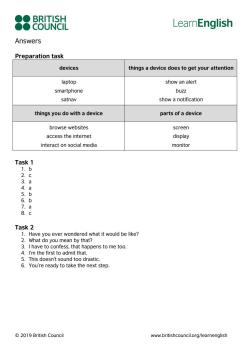
888 LearnEnglish Answers Preparation task devices things a device does to get your attention laptop show an alert smartphone buzz satnav show a notification things you do with a device parts of a device browse websites screen access the internet display interact on social media monitor Task 1 4.a 5.b 6.b 7.a 8.c Task 2 1.Have you ever wondered what it would be like? 2.What do you mean by that? 3.Ihave to confess,that happens to me too. 4. n the first to admit that too drastic 6.You're ready to take the next step. ©2019 British Council www.britishcouncil.org/learnenglish
© 2019 British Council www.britishcouncil.org/learnenglish Answers Preparation task devices things a device does to get your attention laptop smartphone satnav show an alert buzz show a notification things you do with a device parts of a device browse websites access the internet interact on social media screen display monitor Task 1 1. b 2. c 3. a 4. a 5. b 6. b 7. a 8. c Task 2 1. Have you ever wondered what it would be like? 2. What do you mean by that? 3. I have to confess, that happens to me too. 4. I’m the first to admit that. 5. This doesn’t sound too drastic. 6. You’re ready to take the next step
按次数下载不扣除下载券;
注册用户24小时内重复下载只扣除一次;
顺序:VIP每日次数-->可用次数-->下载券;
- 《大学英语》课程教学课件(讲稿)Unit 1 words and phrases to drill.docx
- 长治学院:《英语语音》课程教学资源(教案讲义).pdf
- 新疆大学:《汉英翻译》课程教学课件(PPT讲稿)第六章 语序的转换.ppt
- 新疆大学:《汉英翻译》课程教学课件(PPT讲稿)第九章 汉译英中标点符号.ppt
- 新疆大学:《汉英翻译》课程教学课件(PPT讲稿)第七章 汉语存在的翻译.ppt
- 新疆大学:《汉英翻译》课程教学课件(PPT讲稿)第四章 词的省略.ppt
- 新疆大学:《汉英翻译》课程教学课件(PPT讲稿)第八章 减词法 Economy of Expressions.ppt
- 新疆大学:《汉英翻译》课程教学课件(PPT讲稿)第五章 词性转换.ppt
- 新疆大学:《汉英翻译》课程教学课件(PPT讲稿)第二章 词的选择.ppt
- 新疆大学:《汉英翻译》课程教学课件(PPT讲稿)第三章 词的增补.ppt
- 新疆大学:《汉英翻译》课程教学课件(PPT讲稿)第一章 翻译启示录.ppt
- 新疆大学:《汉英翻译》课程教学课件(PPT讲稿)第十章 广告英译大观园.ppt
- 新疆大学:《汉英翻译》课程教学课件(PPT讲稿)第十二讲 正说与反说.ppt
- 新疆大学:《汉英翻译》课程教学课件(PPT讲稿)第十七讲 汉译英中标点符号的运用.ppt
- 新疆大学:《汉英翻译》课程教学课件(PPT讲稿)第十一章 科技英语的翻译特点.ppt
- 新疆大学:《汉英翻译》课程教学课件(PPT讲稿)第十四讲 汉语连动式的翻译.ppt
- 新疆大学:《汉英翻译》课程教学课件(PPT讲稿)第十六讲 汉语并列句的翻译.ppt
- 新疆大学:《汉英翻译》课程教学课件(PPT讲稿)第十五讲 新疆旅游资料翻译特点.ppt
- 新疆大学:《汉英翻译》课程教学课件(PPT讲稿)第十三讲 题目翻译.ppt
- 新疆大学:《汉英翻译》课程授课教案(讲义,共七章,负责人:谢旭升).pdf
- 《大学英语》课程教学课件(讲稿)Listen for the specific information.pdf
- 《大学英语》课程教学课件(PPT讲稿)How to Talk About the Past in English.pptx
- 《大学英语》课程教学课件(PPT讲稿)How to Tell a Story in English.pptx
- 《大学英语》课程教学资源(书籍文献)英语四级翻译(华研外语).pdf
- 《大学英语》课程教学课件(PPT讲稿)Describing People’s Appearance.pptx
- 《大学英语》课程教学课件(讲稿)Unit 2 Friendship language focus.docx
- 《大学英语》课程教学课件(讲稿)Unit 2 friendship words for drill.docx
- 《大学英语》课程教学课件(讲稿)Conditionals.pdf
- 《大学英语》课程教学课件(PPT讲稿)How to talk about movie and film in ENGLISH.pptx
- 《大学英语》课程教学课件(讲稿)Describe Your Hometown.docx
- 《大学英语》课程教学课件(讲稿)How to introduce your hometown.pdf
- 《大学英语》课程教学课件(讲稿)Time-order signal words and expressions.pdf
- 《大学英语》课程教学课件(PPT讲稿)unit 1 answers.pptx
- 《大学英语》课程教学课件(讲稿)Unit 3 language focus.docx
- 《大学英语》课程教学课件(PPT讲稿)unit 2 answers.pptx
- 《大学英语》课程教学课件(讲稿)Unit 3 words to drill.docx
- 《大学英语》课程教学课件(PPT讲稿)unit 3 answers.pptx
- 《大学英语》课程教学课件(PPT讲稿)How to Talk About Transport.pptx
- 《大学英语》课程教学课件(讲稿)transportation in your hometown.docx
- 《大学英语》课程教学课件(讲稿)Unit 6 language focus.docx
